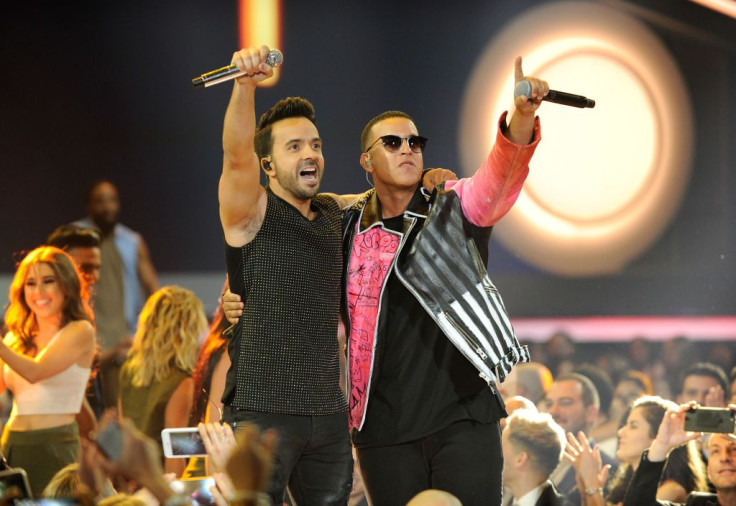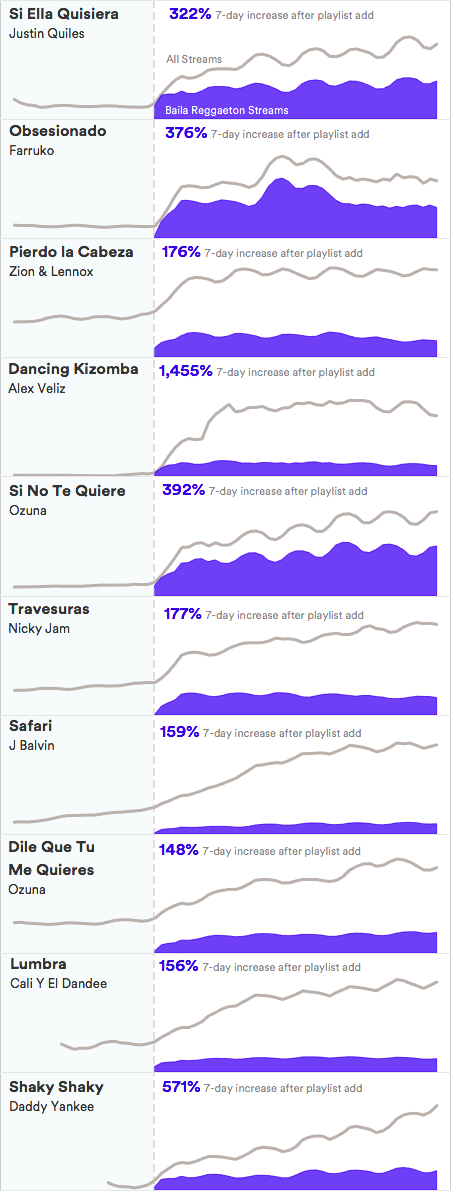
Latin music, in particular the reggaeton genre, with its addictive start-stop beat, has expanded far beyond its places of origin to become a global genre that regularly tops the charts. Throughout the summer, Luis Fonsi and Daddy Yankee’s “Despacito - Remix,” featuring none other than Justin Bieber singing in Spanish, followed by J Balvin’s “Mi Gente,” topped the charts.
That reggaeton rhythm and influence -which reggaeton in turn had borrowed from dancehall- can be heard in all kinds of songs, including Ed Sheeran’s “Shape of You,” the second-most-played song on Spotify ever. Other non-reggaeton hits where you can hear this Latin influence include OneRepublic’s “No Vacancy,” Sia’s “Cheap Thrills,” Justin Bieber’s “Sorry,” recent tracks by Major Lazer, and French Montana’s “Unforgettable,” which then boomeranged back to the Latin scene with a Latin Remix by J Balvin.

Reggaeton took over summer 2017 like fire, and that fire has actually been building for years. As Spotify grew from 10 million users in May 2014 to 140 million users in June 2017, the reggaeton genre’s share of all Spotify listening grew 119 percent. By comparison, pop’s share increased 13 percent over the same period, and country music’s share 4 percent.
“It is so gratifying to watch reggaeton explode and see the reactions from the artists,” said Rocio Guerrero, who leads Spotify’s programming and curation of Latin music. “It went from an inconspicuous sub-genre to this huge market-changing factor. We also look forward to helping other Latin genres grow and using our platform to close the gender gap that is prevalent in reggaeton and Latin music in general.”
Launched in November 2013 by Rocio Guerrero, Head of Global Cultures, Shows & Editorial at Spotify, the Baila Reggaeton playlist (translation: “dance reggaeton”) has increased streams of key reggaeton hits over the years, while bringing new fans to the genre and new reggaeton to the fans. Including a song on this playlist -- the third most popular on Spotify worldwide -- provides not just a big boost to plays, but a permanent uplift as awareness of the track increases:

Baila Reggaeton had the following (eventual) hits the same day they were released (thus not included above), but it speaks to Rocio Guerrero’s curation of the Baila Reggaeton playlist that they were included on day one:
- J Balvin - “ Mi Gente”
- J Balvin - “Bobo”
- Luis Fonsi, Daddy Yankee - “ Despacito”
- Zion & Lennox - “Otra Vez (feat. J Valvin)”
- J Balvin - “Ginza”
- Nicky Jam - “ El Perdón” and “Hasta el Amanecer”
- Maluma - “Borro Cassette”
- C.Tangana - " Mala Mujer"
“The importance of being part of Spotify’s Baila Reggaeton playlist is that those interested in the genre, as well as existing fans have access to the latest in Reggaeton,” said J Balvin, whose hits “ Mi Gente” and “ Bobo” were included in Baila Reggaeton on the day of their release. “In turn, this expands the reach of the genre and our culture worldwide. I feel extremely blessed each time one of my songs makes it on a chart – this is one more reason to celebrate”
“Definitely, Baila Reggaeton is an extremely important playlist for exponents of urban music, with over five million subscribers,” said Daddy Yankee, whose “Shaky Shaky” saw a 439 percent boost in plays after it was added to Baila Reggaeton. “It shows the power of our music globally, especially with Reggaeton. I realized Spotify’s influence when I saw radio programmers looking to these types of playlists to program the most popular songs on their stations. Every day, the game keeps changing.”
Most reggaeton is created in Colombia and Puerto Rico. So, how much reggaeton is exported worldwide? Colombia and Puerto Rico have listened to around 7,500 years of reggaeton on Spotify since January 2014, while reggaeton importers - i.e. the rest of the world - have listened to approximately 140,000 “reggaeton years” during the same time span. Thus 95 percent of reggaeton is “exported,” in that listening happens outside of its nations of origin.
Perhaps no more perfect example of reggaeton entering the global mainstream exists than the Despacito remix. Luis Fonsi and Daddy Yankee’s Spanish-language original, released in January, has become a massive global hit over the course of the year, especially in Latin American countries, and remains on our global charts despite having been released eight months ago.
Meanwhile, the Bieber-featuring remix, released in April, currently claims the number two spot on the global chart, as mentioned above. The original and remix have combined for over 1.3 billion streams to date.
The Despacito remix isn’t the first time a reggaeton artist has partnered with a mainstream artist to release a global hit together -- see also Wisin & Yandel’s “Algo Me Gusta De Ti,” featuring Chris Brown and T-Pain; J Balvin’s “Safari,” featuring Pharrell Williams, BIA, and Sky; and the Latin remix of the already-reggaeton-infused “Shape of You” by Ed Sheeran, featuring Zion & Lennox.
Now that reggaeton is a global force to be reckoned in its own right, and as an influence on pop and other music, we’ll likely to continue to see more solo reggaeton artists on the charts.
© 2025 Latin Times. All rights reserved. Do not reproduce without permission.






